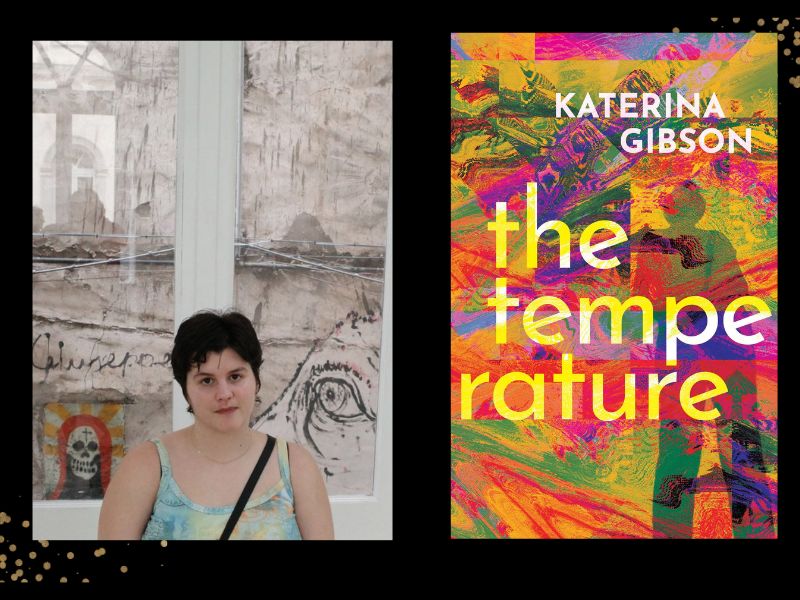Katerina Gibson’s debut collection, Women I Know, a much-lauded work that garnered the 2023 Christina Stead Prize for Fiction and Steele Rudd Award, and was on the shortlist for the Glenda Adams Prize for New Writing, marked her as a voice of considerable promise in contemporary literature. With her latest offering, The Temperature, Gibson does not so much extend that promise as deepen it with a narrative that is as thematically rich as it is stylistically assured.
In the novel, the chapters alternate between Fi (a performative Millennial media writer whose Twitter presence is both weapon and shield), Sidney (a disenchanted poet in seasonal hibernation), Tomas (a father with a green thumb, steeped in a quiet despair), Lexi (a fervent activist haunted by her past), Govita (a visual artist teetering on the edge of hedonism and nihilism) and Henry (a Vietnam veteran living out his twilight years in rural isolation).
In a world increasingly defined by fragmentation – algorithmic or otherwise – these seemingly disparate characters are connected via the existential weight of climate change, the omnipresent influence of social media (remember Twitter?), political divide and the shifting sands of gender and sexuality. So, the usual. They serve as lenses through which these issues are refracted – each embodying a distinct relationship with the climate crisis.
There’s Govita, who opts for detachment until the crisis breaches their personal sphere in the shape of a revelatory dog, Lexi, whose life has become a crusade against ecological collapse and others who navigate the choppy waters between anxious concern and surrender. Under the pen of a writer with less range, these characters might risk devolving into archetypes – a keyboard warrior, a “Karen” et – but Gibson instils each with a depth and complexity that makes them, well, human – flawed, emotional and contradictory.
Throughout the novel these six characters’ lives intersect in ways that are by turns surprising and inevitable, forcing each to confront their assumptions about the world and their place within it. Gibson navigates the intersections of these lives against the backdrop of major Australian cultural and political influences – such as the devastating bushfires of 2020, the COVID-19 pandemic, the contentious Adani coal mine and the enduring significance of the Murray River.
The novel also contains a sense of temporal fluidity, where cultural symbols like The Beatles and Helen Garner’s Monkey Grip operate as both historical anchors and enduring markers, highlighting the desires and passions that define and ultimately transcend generations. These touchstones remind us that, while each generation may forge its own path, certain axioms, enduring political debates and cultural imprints echo across times and, in this novel, connect the characters in a shared, if fractured, history.
At its core, The Temperature is a meditation on the cyclical nature of human existence – grief, catastrophe and revelation are not merely events but processes, constantly in motion, reshaping the world and the people within it. It is a novel that asks not only whether we can survive the end of the world, but whether we can learn, grow and even thrive amid the ruins. This exploration is demonstrated through the journeys of its characters. However, the resolution for some characters, like Fi, feels more rushed compared to the more nuanced endings of others.
The prose itself is marked by a lyrical precision, with Gibson’s descriptive passages evoking the Australian landscape in all its multicoloured beauty and lingering colonial shadows. Her ability to render the urban and rural alike – whether it be the undulating refractions of light on a pool bottom, or the languorous braiding of a river’s flow – is a testament to her command of language. There is a poignancy in her imagery that lingers, a subtle undercurrent of melancholy that permeates even the most ostensibly benign passages.
Read: Book review: Pig City, Andrew Stafford
In the end, The Temperature is as much about the external crises that define our times as it is about the internal landscapes of its characters – their fears, hopes and desires. It is a novel so engaging it demands to be read, not just as a commentary on our current moment, but as an exploration of what it means to be human in a world that is rapidly and perhaps irreversibly, changing.
The Temperature, Katerina Gibson
Publisher: Simon & Schuster (Scribner)
ISBN: 9781761426544
Format: Paperback
Pages: 304pp
Release date: 4 September 2024
RRP: $32.99






